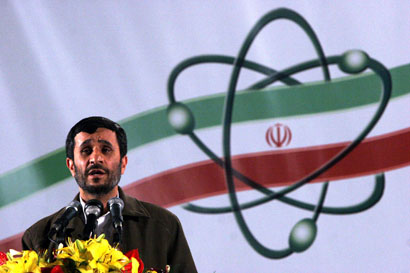The idea of Iran as a regional marauder that is gobbling up other countries in the Middle East and against which pressure must therefore be unrelenting has become one of the favorite themes of those determined to kill the nuclear agreement with Tehran. As an argument for rejecting the nuclear deal, this approach has always suffered from major factual and logical flaws.
Given the casual and automatic manner in which references to Iran supposedly sowing mayhem all over the region are routinely worked into almost any discussion of policy toward Iran, it perhaps is too much to expect many people to stop and study the flaws. Perhaps we should just remind people who make those casual references that if Iran really were bent on causing all that mayhem, that is all the more reason to support an agreement to assure that the marauder does not get a nuclear weapon.
Iran’s Supreme Leader Ali Khamenei sitting next to President Hassan Rouhani and addressing the cabinet.
Iran’s Supreme Leader Ali Khamenei sitting next to President Hassan Rouhani and addressing the cabinet.
But let’s not abandon facts and logic just yet. The main fact on this subject is that Iran hasn’t been doing anything close to the country-gobbling, capital-controlling, instability-creating stuff in the Middle East that it routinely gets accused of doing. Its regional activity is best characterized as the understandable and unsurprising reactions of a major regional state to an assortment of conflicts in its neighborhood that are not of its own making.
As Jon Alterman has put it, “The reality is the Iranians don’t control any Arab capital, and they couldn’t if they tried. Iraqis have a strong sense of nationalism and self-interest, as do Syrians, Lebanese and Yemenis. If you were an Iranian trying to impose your will, you’d be tearing your hair out. There is no Iranian ‘order’ in the region.” Instead, there is a lot of disorder, and amid that disorder the Iranian goal, says Alterman, “is to survive in a hostile world.”

